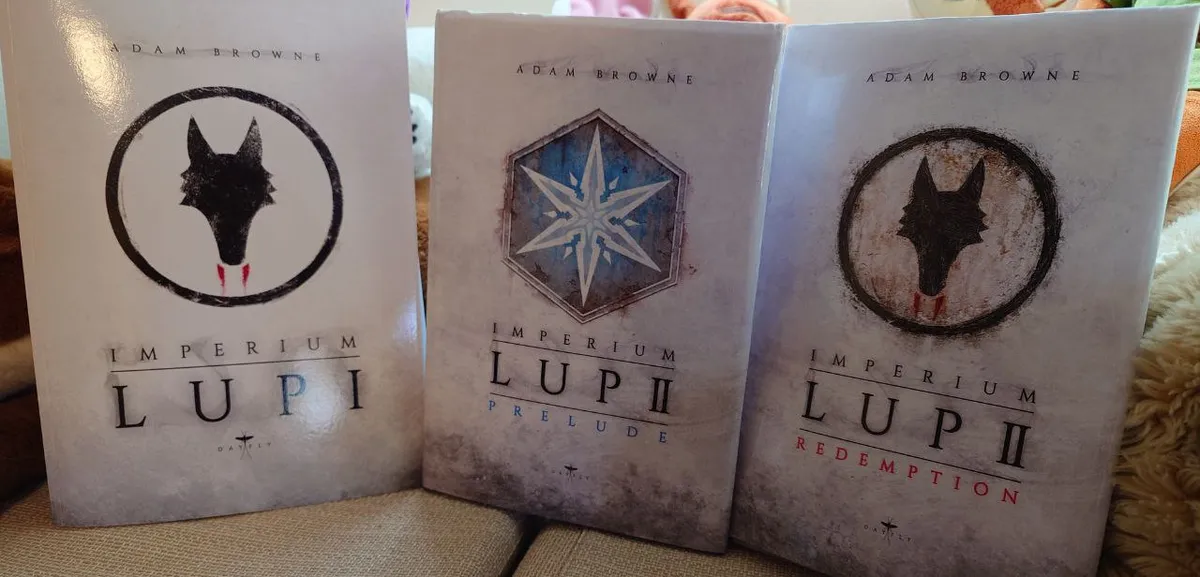Imperium Lupi

You know when you get that Finished a Good Thing feeling? When you've completed something so good that you are both left really elated about the whole experience but also sad because it means it's now over, and most of your waking thoughts afterwards revolve around said experience, thinking about the critical scenes and imagining what happens after the ending?
Earlier this week I finished reading Imperium Lupi II by Adam Browne, the sequel to 2017's Imperium Lupi. A friend of mine is such a huge fan of the book that he gifted me a copy a birthday or two back out of the blue because 1) I read books and 2) he desperately needed someone else to talk about the series with. I soon understood why because I, too, became quickly fixated with the enormous tome. When pre-orders opened up for the second book late last year, it was an immediate buy for me.
The extremely truncated summary is that both books are set in Erde, a relatively realistic fantasy world with no magic, dominated by nation states and tribes of various anthropomorphic animal species (and always has been - no humans at all which is such a good thing) - as per the book titles, the main perspective we follow is that of the inhabitants of the wolf republic of Lupa. Erde is on the cusp of its industrial revolution, through utilising a natural resource called imperium - effectively a mix of electricity, raw oil and uranium all in one. Imperium is everywhere and is an enormously useful (if polluting) source of energy allowing for various scientific marvels; but due to ambient exposure it can also concentrate within bodies of individuals. If there's enough of the toxic good stuff in their bodies individuals can then use their innate radiation levels to project the energy outwards, allowing for incredible feats; the downside is that the more you use it, the more it straight-up rots you from the inside as the imperium penetrates further into your tissues. This all creates all manners of instabilities, and it acts as the backdrop for the actual plot of the books, which revolve around the political machinations between the various parties in power, secretive conspiracies within Lupa that try to upset the existing balance and the multiple threads of different, initially unrelated characters who find themselves as part of the same wider picture.
Why I fell in love with Imperium Lupi is because of both the world and the characters within, and because of Browne's writing which brings it all to life in such a lush way. Browne's language is imaginative, gripping and full of intricate detail, and his ability to keep you wanting to read one more chapter is frighteningly strong. As a huge fan of bold world building, the Imperium Lupi books are so rich and well thought-out in this respect: the world has a genuine sense of history, its quirks have explanations that make sense and the science behind e.g. imperium is constantly explored, and the wide set of traditions and norms behind the different nations and (most prominently) wolf packs that make up the capital of Lupa are established with such distinctive detail that every piece of information makes you more invested. The countless characters - there are many - are all fleshed out so distinctively and with such different personalities that it's not only really easy to keep track of who's who, but you also grow really attached to them. I can't remember the last time I read a book where I was genuinely dreading whether a character I had grown really fond of was actually going to meet an unlucky end, which serves to highlight how deep I fell in love with the world and the people within. The pace of the books is steadily intensifying, with positively slow starts (IMO - I love a long introduction) to allow for various character moments to establish everyone's place in the world until the plot starts ramping up. It's admirable just how well Browne places the puzzle pieces together bit by bit across the hundreds of pages, and then when the full picture finally clicks into place it feels rewarding.
I would be amiss if I didn't also mention that personally, I really enjoy the prevalence of queer relationships throughout both books, especially the second where one such relationship forms a central narrative character development thread. It's not to such extent that I would define the books by it (if you take one thing away from this post it's that these book stand as great fantasy stories in their own right, and not simply within some 'gay furry fiction' pigeonhole), but I guess this is once again what we mean by representation mattering. I typically find romance threads in stories more of a hindrance than a positive presence, but it just plays out differently when it's something that reflects my own preferences.
The books are quite hefty, so be warned: the second book actually had to be split into two different tomes with about 1k pages each (unless you're mad and go for the gigantic omnibus edition which I presume needs to be placed on a plinth to be read). But I read them with such record speed, I couldn't keep myself away from them. I love the world of Erde and the stories within the two Imperium Lupi books, and I could honestly devour an entire encyclopedia of just the history of the realm itself. If you're into fantasy fiction I can't recommend them enough. Do it for my sake - like my friend, I need more people to talk about what a precious cinnamon bun Linus Mills is.